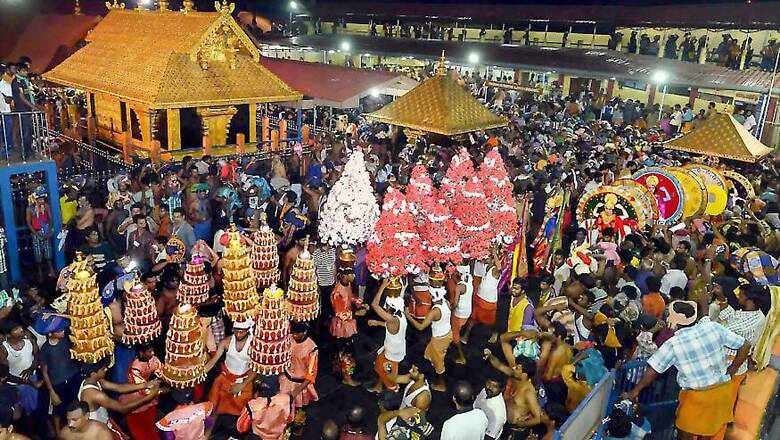
views
Nearly a hundred years after the Temple Entry proclamation of 1936 that abolished the ban on the 'low caste people' from entering Hindu temples in the Princely State of Travancore, Kerala was the beneficiary of yet another major social reform as the Supreme Court allowed women to enter and pray at the Sabarimala temple.
A few days after the historic ruling, there have been murmurs of discontent within a section of the Hindu community in the state.
This has resulted in the first protest meeting against the judgment, which took place in Pandalam in central Kerala, en route to the Sabarimala temple.
The organisers claim that 50,000 women took part in the procession on October 2. “We don’t want to go to the temple. The verdict is quite saddening for us, it has even put us under mental stress. We won’t be able to see women entering the temple. We will seek the support of all Hindus to resist the entry of women,” a participant Suresh Kumari was quoted as saying.
Such reactions can be termed as one arising out of the culture shock of an age-old religious tenet being thrown out of the window. Social reform, especially arising out of tweaking age-old religious tenets, takes time to find its roots.
Significantly, even Gandhi expressed his doubts about the validity of the Temple Entry proclamation, wondering how the elite caste Hindus would take to such radical reform which allowed lower castes to enter temples. “When the Temple Entry Proclamation was issued, I had misgivings which I could not suppress. Was it a political document with loopholes and reservations? What would be its impact on caste Hindus? If it was a super-imposed thing what would be its effect on Harijans? Would it not leave them in the cold,” Gandhi wrote. Later, he supported the entry of all castes.
The point here is that religion has always resisted reform and that lies at the basis of the practise and spread of religion itself.
The political parties in Kerala are in a quandary and no politician is willing to openly support the judgment or attack it. The BJP senses an opportunity to increase its footprint in the state where it made its debut into the Assembly just last year. Even the BJP leaders have half-heartedly supported the SC judgment, but it is clear that the RSS is trying to muddy the waters by helping organise meetings and protests like the one in Pandalam.
“Scores of workers of the BJP and other Sangh parivar organisations took part. I too attended it,” Ashokan Kulanada, district president of the BJP was quoted as saying about the Pandalam protest.
The Congress chief minister aspirant Ramesh Chennithala, who is close to the Nair Service Society, has visited some members of the royal family to support the patriarchal view of not allowing women. The Congress is split down the middle in the state on this issue mainly because it fears that its high caste Hindu vote bank will be unhappy.
With CM Pinarayi Vijayan bravely standing with the progressive view and supporting the judgment and deciding not to go in for a revision appeal, the Congress feels that it is the right time to play its soft Hindutva card in Kerala too. This is the significance of the Chennithala’s muted visit to the Pandalam palace.
One of the leaders of the movement to keep Sabarimala “pure” (suggesting that menstruating women are impure) is Rahul Easwar, who belongs to a priestly family and thus considers the temple family property. “We will not stop feminists and other women who come to the temple. We will not push them. But prepare yourselves, for they can only go to the temple by stomping our hearts,” he said, mixing threat with religious fervour.
The Devasom Board, government body which controls temples, has welcomed the judgment and arrangements are being made to reserve 25% seats in all buses going to the temple area for women.
The board will also have to make arrangements for separate pathways or separate days for women to enter the sanctum sanctorum of the Ayyappa temple by the time the season starts on October 17.
Patriarchal notions about purity abound in a conservative society like Kerala. Sabarimala imposes a 40-day abstinence on pilgrims, including no shaving, no meat, fish, alcohol and no sex. The local wag will tell you that Kerala women encouraged their husbands to go to Sabarimala, which gives them much-needed relief at least for a month. A well-known criminal case in Kerala involved a man stabbing his wife to death after she refused sex during the abstinence period.
So this entire notion of becoming a new man or a purified man after a Sabarimala trip (unlike other temple visits) can now be appropriated by the women too. They too can now claim purity by undergoing the 40-day vritham (penance), walking up the hills and then meeting the bachelor Ayyappan with a irrumudi kettu (offering) on their heads.
Till late 19th century lower caste women in Kerala were not allowed to cover their breasts when higher caste men walked past. This was the utter indignity from which Kerala’s women rose to a life of full freedom and total literacy. To even imagine that a contrived protest, like the one in Pandalam, is reflective of what women of the state feel about themselves is dangerous. The Pandalam protest cannot be seen as anything but the last vestiges of a forgotten patriarchy raising its tentacles for the last time.
(The author is a senior journalist. Views are personal)




















Comments
0 comment